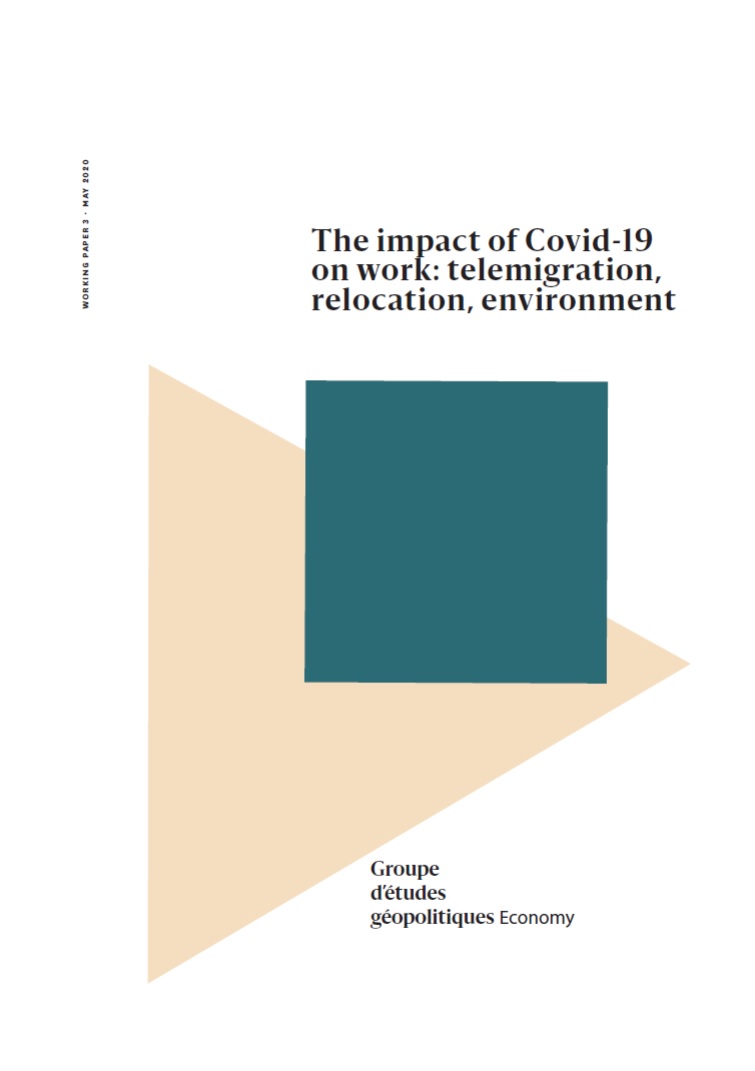The impact of Covid-19 on work : telemigration, relocation, environnement
Cyprien Batut
French economist currently working in the French Treasury Télécharger le pdf
01/05/2020

The impact of Covid-19 on work : telemigration, relocation, environnement

Cyprien Batut
French economist currently working in the French Treasury
01/05/2020

 Voir tous les articles
Voir tous les articles
The impact of Covid-19 on work : telemigration, relocation, environnement
Heterogeneous data, knowledge and profiles that rarely meet must be brought together to give shape, during the crisis, to the world that will come after. The Groupe d’études géopolitiques releases today, within the framework of the Covid-19 Geopolitical Observatory, its third working paper which reviews the state of play and formulates preliminary hypotheses on the short- and long-term effects of the pandemic on the energy sector, signed by Cyprien Batut, with a foreword by Andrea Garnero.
The impact of Covid-19 on work : telemigration, relocation, environnement
One of the consequences of containment may be, through the creation of new habits, rather than a technological revolution, the widespread adoption of telework. However, this revolution will only be that of a minority of workers, mainly managers and relatively well-paid profesionnals.
This note is a prospective exercise which tries to consider the consequences of this evolution :
- They are primarily environmental. We can expect a reduction in daily or one-off trips for professional reasons. The immediate result would be a reduction in greenhouse gas emissions, of which the effect of confinement on air quality in European cities is a foretaste. Cautions is however necessary in this regard, teleworking is not environmentally neutral, network infrastructures that make this form of work possible are also sources of pollution.
- The emergence of telework then has the potential to introduce a new player in the labour market : the « tele-migrant » in the words of economist Richard Baldwin. While skilled workers have hitherto been protected from the effects of globalisation, the situation could change, as many skilled freelancers, particularly from the South, are now able to compete with them. But this opening up may be an opportunity, as the French and European economies are structurally short of skilled workers in many fields. Telemigrants are an opportunity to democratize access to certain services that are still not available to all, especially in smaller companies : programming, accounting, training, etc. If telemigrants increase the size of the pie faster than they reduce the number of slices, then their arrival will be a boon rather than a tragedy.
- Finally, by disconnecting living and working spaces for part of the population, telework could change the very shape of cities and the dynamics of spatial inequalities, with ambiguous effects. On the one hand, telework represents for part of the urban settings the possibility of relocating to places where life is cheaper and probably more pleasant. On the other hand, the maximum size of a city depends on the size of its labour market and then to some extent on the answer to the question : « How many jobs can I access in an hour’s journey?Teleworking abolishes this limit and could therefore, on the contrary, increase the concentration of activity in a few cities. The precedent of the Internet revolution in the United States goes along these lines.
Due to time constraints, many other aspects have been set aside but are equally important. A future telework policy, which may or may not encourage its development, will have to take these multiple elements into account.
citer l'article
Cyprien Batut, The impact of Covid-19 on work : telemigration, relocation, environnement, May 2020,




